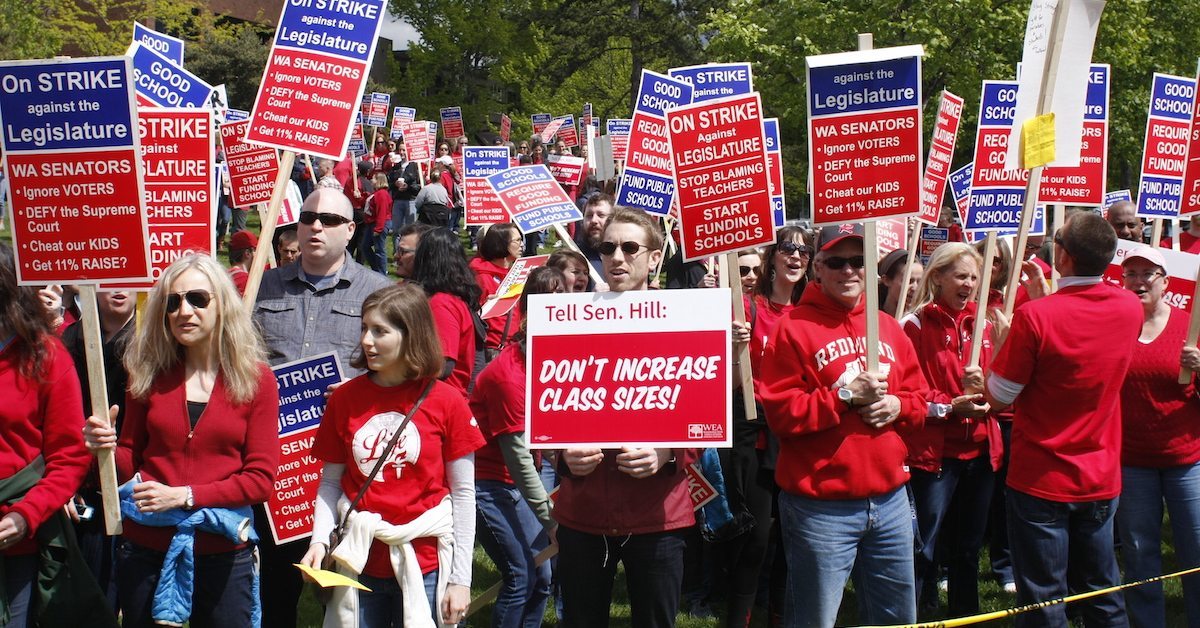Sure, we know there’s still some confusion over what the definition of “is” is. And that “truth isn’t truth,” apparently. So the state teachers union, the WEA, isn’t breaking any records for duplicitousness when it comes to its muddled messaging on whether teacher strikes are legal or not.
Which is a bit like Adam Sandler saying, hey, somebody else out there has probably made more bad movies than he has. True, maybe, but hardly reassuring.
Local teachers unions all over the state are striking, or threatening to strike. The new school year is just around the corner, but teachers are prepared to walk off the job in Longview, Vancouver, Tri-Cities, Mukilteo, Spokane, Highline – and many other places. In over 100 districts, teachers unions and administrators are still wrangling over pay.
The WEA and local unions are going for broke this year – with a strategy to essentially bankrupt districts. That teacher strikes are illegal doesn’t matter to them. That many of them are in the middle of current contracts also doesn’t matter to them. Work stoppages are bad for kids? Doesn’t matter.
Why is it happening?
To wrap up the long-running McCleary education funding case, the state allocated even more money for K-12 schools this year. Some of that is meant for higher salaries. But the WEA is determined to grab all of it, consequences be damned.
That the entire pot of money wasn’t meant for salaries means little to the WEA. It wants to grab the new money, now – and if the Legislature still wants to fund other priorities such as smaller class sizes, it’ll just have to find other money to do it.
Some local unions are asking for raises topping 30%. If the unions get what they want, or even come close, the districts will soon be in the red.
And that’s exactly what the WEA wants. It wants local districts locking in unaffordable contracts that basically force the state to step in and increase K-12 funding even higher, above the already astronomical increases in recent years.
Editorial boards around the state are urging caution, but the WEA is throwing caution to the wind. It’s actually bragging about massive teacher salaries that far, far outpace average salaries. The unions are counting on two sources of money that soon won’t be available to cover higher salaries: Higher local levy rates, which are set to be capped next year, and class size reduction funds, which will disappear next year if districts aren’t actually spending it to lower class sizes.
The Seattle Times asked districts to be responsible with their budgets: “To avoid returning to a broken system, districts must hold the line when it comes to negotiating teachers’ raises, and not award more than they can afford.” It also noted the new 20% raises in Edmonds, and the top-end teacher salary there: $114,272.
So are teacher strikes legal?
The WEA would have you believe the whole subject of whether or not teacher strikes are even legal is somehow murky or ambiguous. It isn’t – teacher strikes are clearly illegal. In fact, under state law public employee strikes of any kind are illegal. That covers public school teachers too.
The president of Vancouver’s teachers union asserted this week, “Judges have not ruled completely whether strikes are illegal.” But that simply isn’t true.
In fact, a judge in a 2015 Pasco strike case not only ruled that teachers there were barred from striking, he helpfully included in his ruling previous rulings around the state establishing the illegality of strikes:
- King County Superior Court Judge DuBuque (2002): “Teachers do not have the right to strike, and what is going on is an illegal strike at this time…I must enforce the law. And the law, in my assessment based upon an extensive search of Washington law is clear. Public employees may not strike.”
- Snohomish County Superior Court Judge Krese (2003): “Public employee strikes are illegal under the common law of Washington. The MEA strike violates the prohibition on public employee strikes and is an illegal strike.”
- King County Superior Court Judge Darvas (2009): “The law is clear that teachers do not have a right to strike under Washington law…the strike is unlawful, and it is harming children and their families.”
- Franklin County Superior Court Judge Ekstrom (2015): “Case law is clear, however, that strikes by public employees are illegal. Families rely on school schedules and schools play a critical role in the operation of society.”
Some try to point out that, while state law doesn’t allow strikes, it also doesn’t spell out specific penalties. That doesn’t make strikes legal, nor does that mean there cannot be penalties. Judges can order strikes to end and fine or jail those who ignore orders.
That means nothing to union leaders like Steve McKenna in Yakima. Asked about the possibility of an injunction ordering him and his fellow teachers back to work, McKenna told the Yakima Herald-Republic, “We would ignore an injunction.”
Not only do the WEA and its locals ignore the illegality of strikes, they apparently plan to ignore legitimate court orders too. There’s a word for that: Lawless.




